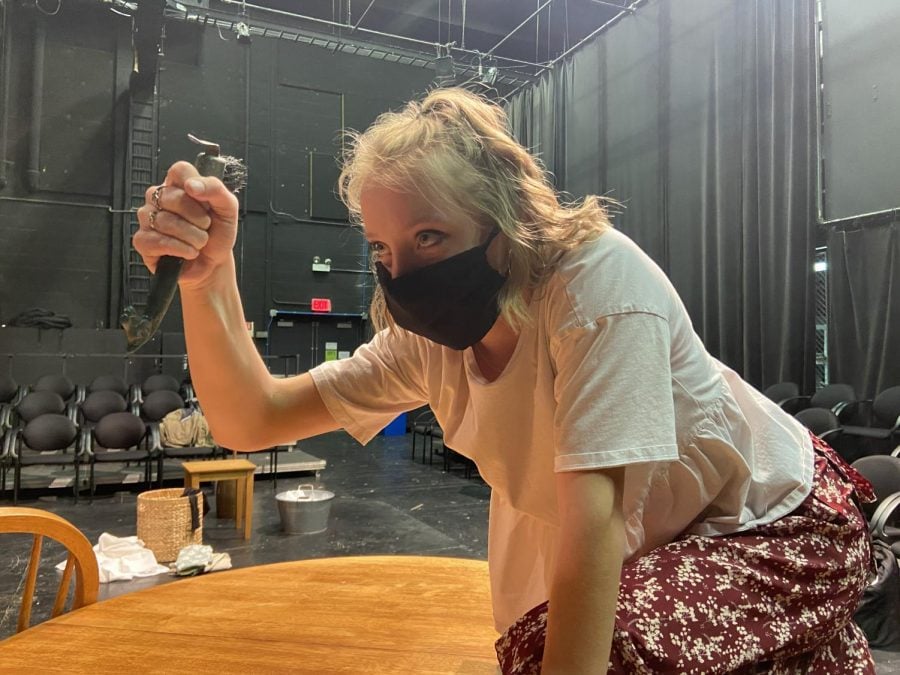Wirtz Student Theatre Project “Desdemona” breaks down sexual stigma
Photo courtesy of Emma McElwee
Communication freshman Veronica Szafoni in rehearsal for “Desdemona: A Play about a Handkerchief.” She plays Bianca in the show.
May 10, 2021
A&E
Most interpretations of Shakespeare’s tragedy “Othello” center the perspectives of men like Iago or Othello himself, but a Wirtz Center for the Performing Arts Student Theatre & Performance Project seeks to empower the female characters.
“Desdemona: A Play about a Handkerchief” aims to raise up the titular character by positively portraying women’s sexuality. The play, written in 1994 by Paula Vogel, will premiere digitally May 28 to 30.
The team is filming and editing the play’s thirty scenes for viewers to stream for free on Broadway On Demand.
Director and Communication sophomore Sydney Tennill said she is interested in using art to break down the stigma around sex. “Desdemona” features characters who engage in sex work without shying away from it.
“There’s a lot of sex negativity in our culture, and shame, especially when it comes to women and their sexuality,” Tennill, who is also a member of Northwestern’s Sexual Health and Assault Peer Educators, said. “The show talks a lot about sex, and it talks a lot about women with various experiences.”
The play follows three women – Desdemona, Emilia and Bianca. Desdemona, an upper-class woman, takes to sex work while navigating martial problems. Her self-righteous maid, Emilia, is self-righteous and looks negatively on Desdemona’s behavior. Bianca, another prostitute, befriends Desdemona.
Tennill reflected on the depth of these three characters.
“The play does such a good job at really making these women complex and really showing how these women fight for their survival and fight to exist in this world (that) doesn’t give them a lot of options to exist,” Tennill said.
Communication freshman Veronica Szafoni plays Bianca. Working on the play, she said, has been empowering, since Bianca has no shame in sex work and still dreams of getting married, Szafoni said.
Szafoni added that she finds Desdemona and Emilia inspiring as well. Desdemona does not want to “tie herself down,” Szafoni said, adding that Emilia’s strength in her beliefs is notable.
“All of these characters are champions for their own whims and for their own values that they want to stick to,” Szafoni said. “What makes it so cool is (that) it’s feminist, but it’s definitely championing the different things that all these women find themselves attached to.”
The characters’ values show up in their costumes, said Communication and McCormick freshman Courtney Sullivan Wu, the play’s costume designer.
Emilia wears bright colors to signify innocence, while Desdemona’s pastel dress reflects her high class background and value of purity, Sullivan Wu said.
“Each character has a very specific view on their sexuality, how they need to present themselves and their role in society,” she added. “I tried to reflect that through what they’re wearing with the different colors of their costumes.”
Sullivan Wu pointed toward scenes in the show when Desdemona puts on a lacy red robe and explained that the outfit represents the character’s desire. Bianca’s costume is black and red throughout the show because she doesn’t need to project innocence or virtue, Sullivan Wu said.
After watching the play, Tennill said she hopes the audience consider women’s agency over their lives.
“I hope that it starts a lot of conversations about the relationship between women, sex and sexuality,” Tennill said, “(Conversations about) how society teaches women that it shouldn’t be an important part of (their) lives, conversations about how women, even when stripped of all of their agency… fight for a piece of the world.”
Email: oliviaalexander2024@u.northwestern.edu
Twitter: @oliviagalex
Related Stories:
— Wirtz Center increases rehearsal room capacity
— MFA Directing Program student explores equality and art in Wirtz production



